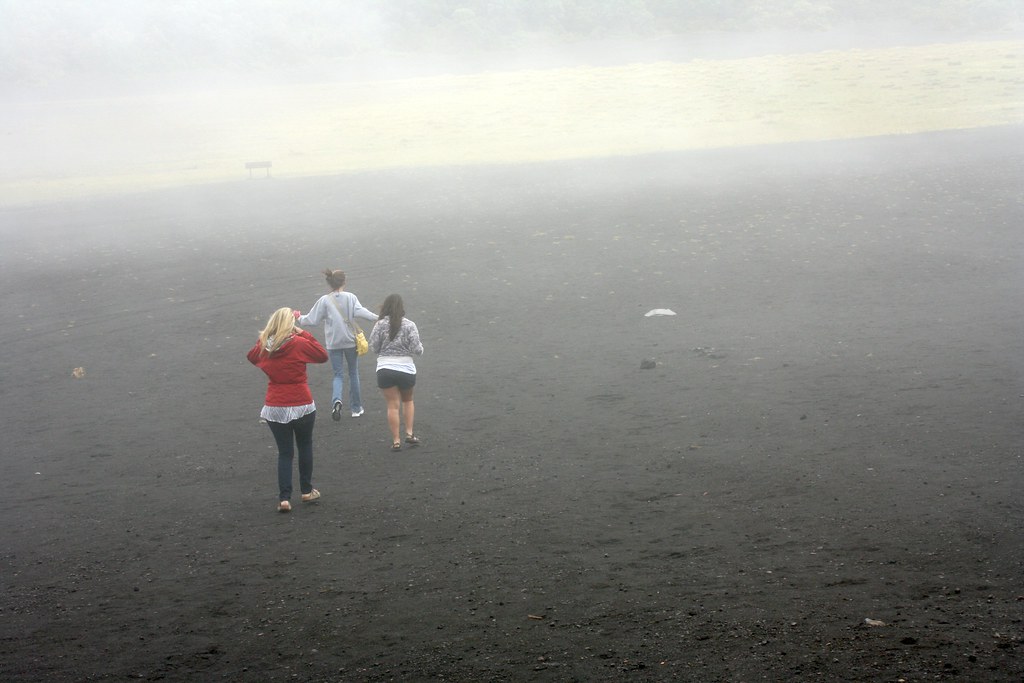9 Ways I Experienced Culture Shock in Costa Rica
In less than three weeks I’ll be setting foot in Spain for the first time, and will be experiencing Spanish culture shock as well. As I begin to pack my bags, I’m mentally preparing myself for the patience I’ll need and for all of the kisses I’ll get (in greetings, duh). This has reminded me of the culture shock I felt when I studied abroad in Costa Rica last year. Studying abroad is fun, but sometimes it sucks, and culture shock is one of its hardest parts. Here are nine ways I experienced this facet of life abroad.
If you’ve ever lived abroad (be it Spain, Costa Rica, or elsewhere), what has caught you off guard or frustrated you about your host country? Comment below!
 |
| Running into the clouds, Irazú Volcano National Park |
1) The rain
It rained right after class almost every single day, and not just a wimpy sprinkle, but a full-on downpour. Coming from Texas, where we often have droughts in the summer, I wasn’t prepared for these daily storms. They were kind of a downer because we had to stay indoors for the remaining daylight hours and couldn’t go exploring the town.2) Crazy traffic
In the States, the pedestrian theoretically has the right of way, but in Costa Rica, the driver has the right of way. I can remember trying to get to the local mall and having to cross a roundabout, which involved running across the busiest street in town about four times—and that was just to get there!3) Too much rice
And when I say “too much,” I mean they eat rice and beans at all three meals of the day—every day of the week. It’s like bread in other cultures (but probably a lot healthier). I’m a pretty open-minded person, and I enjoy eating new things, but after the first week I didn’t want to east rice or beans for a long time. But if you gave me a plate of gallo pinto right now with some scrambled eggs and just-picked-from-the-garden-fresh fruit, I’d love you forever.4) Money
I know, I know, I should expect doing annoying math to be part of any visit to a foreign country, but it shocked me that many stores accepted American dollars as well as colones (500 CRC equal 1 USD). Little did I know, in nearby El Salvador, U.S. dollars are the only official currency.5) How to say “you’re welcome”
In most Spanish-speaking countries, the standard reply to gracias (“thanks!”) is de nada (“you’re welcome,” lit. “it was nothing” or “don’t mention it”). In Costa Rica, they say mucho gusto or con gusto, the equivalent of the Chick-fil-A “my pleasure.”6) Safety fears
Security guards were in a lot of different places—one opened the door for me at Subway and another helped me out at the bank. Most houses and businesses had steel bars over their doors and windows, and, yes, even a few fellow students in the program got mugged. It was a little exhausting having to be alert all the time; I take peace of mind for granted very much in the States.7) Dirtiness of San José
Let me preface this by saying the whole country is BEAUTIFUL, from the beaches, to the mountains, and the towns, too. But the capital city, San José, is just plain dirty. In some parts of town, trash is just collecting off the curbs and graffiti is everywhere. I guess I just hadn’t prepared myself for the realities of a developing country.8) MUCH stronger sun
Yes, I am white. And, although it does get hot in Texas, I can usually avoid getting burned by using sunscreen. But traveling 20 degrees of latitude south really did a number on my pale skin. I went to the beach, I think, three times, and burned—BADLY—each time. No matter how many times I reapplied sunscreen, the burns just got worse. I was lathering the aloe vera gel on me like nobody’s business. But, to be fair, I was using SPF 30 instead of 50.9) Voseo
Voseo is just another set of pronouns and verb forms for the second-person singular (e.g., “you”) that Costa Ricans (and many other Latin Americans) use. Some examples: “¿vos sos de aquí, no?” (“you’re from here, aren’t you?”) and “¿qué opinás vos de eso?” (“what do you think about that?”). I only heard this once or twice, but it was definitely different from the standard tú forms I learned in the classroom.If you’ve ever lived abroad (be it Spain, Costa Rica, or elsewhere), what has caught you off guard or frustrated you about your host country? Comment below!